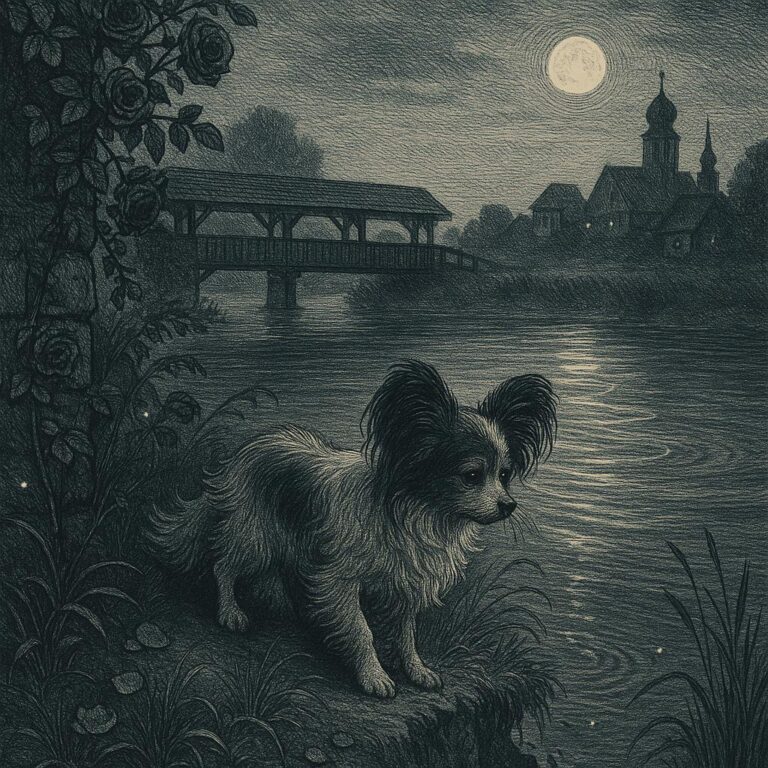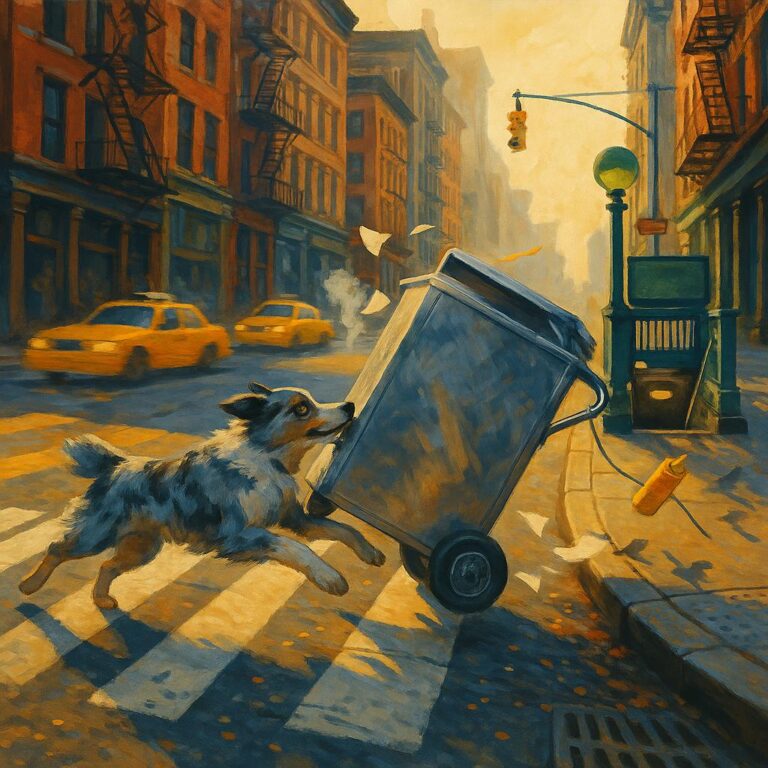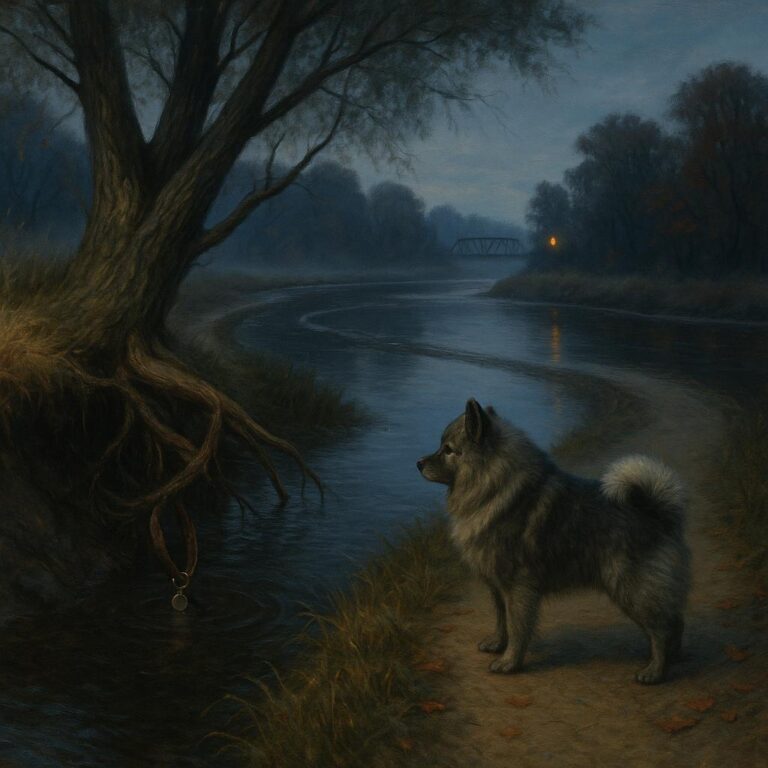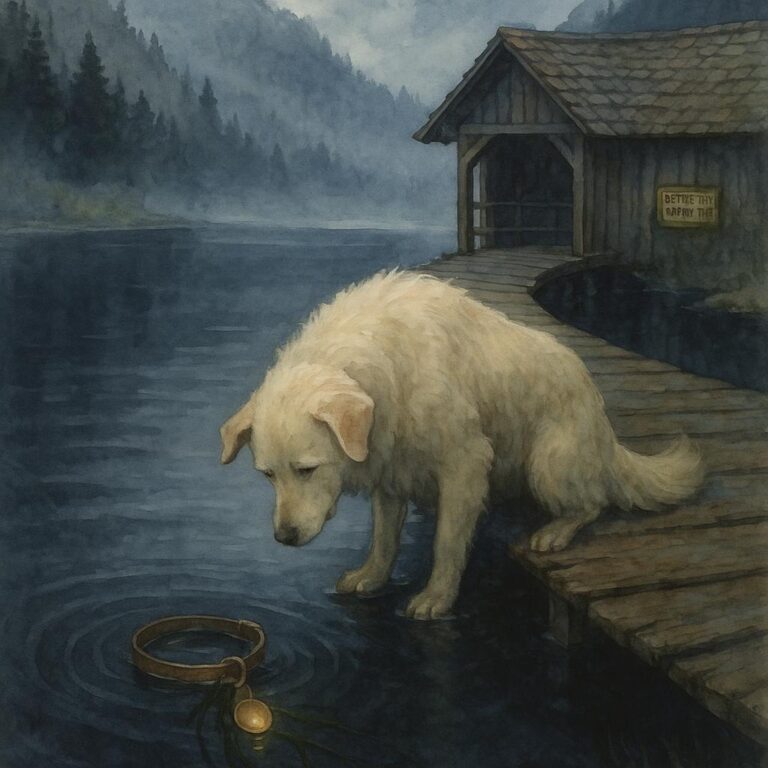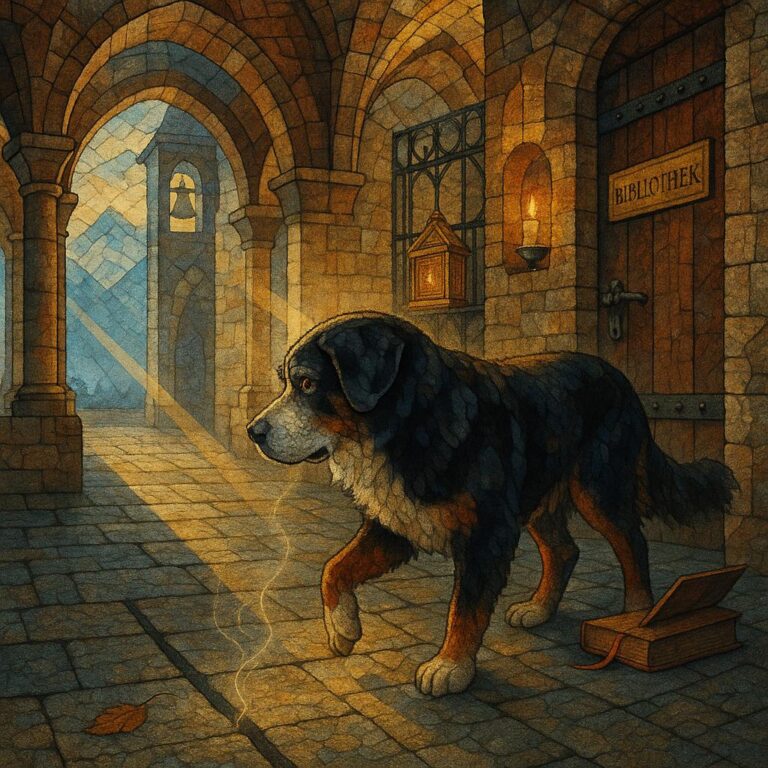Shadow Beneath the Willow

Delta eased along the riverbank, his Chesapeake Bay Retriever coat catching burrs. Fifteen years had thinned his legs but not his nose. The current always smelled like stories, more salt than sweet tonight. He paused at the bent willow where he once leapt like a red fox. He could still swim, he told himself, if needed. The wind carried a human trace, small and bright with fear. The water shivered and a red mitten bobbed between eddies. Delta stepped into the chill, shoulders bracing, when a shadow slid beneath the surface toward him, fast as lightning.
Delta plunged before the cold could cinch him. The first bite of water snapped every nerve awake; the river’s skin went tight around his ribs. The shadow knifed past his knees, a slick muscle of night, and he felt the wake slap his chest. He kept his eyes on the bobbing red—wool and wet and the small, tinny fear he had caught on the wind.
He got the mitten in his teeth and the taste was iron and soap. The mitten wasn’t alone. The line of it led to a wrist, to a sleeve that tugged back, to a body pinned low where the roots of the bent willow bristled into the current. Delta kicked for bottom and found nothing, kicked again and found a hanging root thick as a rope. He hooked an elbow over it and let the river lean him down, nose first, into the tangle.
There—hair like weeds. A little face turned the wrong way, a mouth full of cold. He latched onto the coat cuff. The cuff held something else, a stubborn snag buried under silt. The shadow slid by again, a brown bolt with whiskers, curious, not a monster at all, and the flick of its tail sent a small wave that rocked the root and wobbled the cuff. Delta felt the give. He pushed his back legs to the suck of the current and pulled.
His lungs burned, not from water but from old winters. He’d spent them breaking ice with his chest for ducks that fell in black water and men who laughed and called him bulletproof. His man then had a voice with gravel in it. “Fetch, Del.” The words rose unbidden from the dark of him, and his jaw tightened like it used to against the weight of a canvas decoy.
The snag let go. The child rolled and bumped his muzzle, sudden and heavy and limp as a goose. He shoved upward and got the small head into air. Sound came back in a flood—shouts on the bank, boots scraping dirt, a thin cry like a tea kettle just started. He crabbed sideways for the shallows, dragging, sliding, his hind legs losing and finding purchase in the slick weeds. Hands reached the child. Hands reached him too and missed; he heard the panicked sound they made.
He gave the body up to the hands. They hauled the child onto the mud and turned it and pressed it, and the river poured out of the little mouth like it had been borrowed and was overdue. The child coughed. The cough was a trembling bird that wouldn’t settle. Delta stood belly-deep with the willow combing his spine and watched until the cough became crying and the crying became hiccups that smelled like relief. A woman’s knees sank into the muck beside the child. Her coat brushed Delta’s nose and her scent was sharp with fear-sweat and shampoo. She reached blindly and caught his ear. Her fingers shook there, clutching as if his ear were another root.
He hauled himself out and shook once, a whole-body thunder that flung diamonds of river under the willow. His hips quivered. A burr still clung stubborn under his tail. He nosed at the red mitten, now on the bank, and nudged it toward the little hand. The child’s eyes were open now, sea-blue and bewildered. A wet palm pressed clumsily onto his forehead. He closed his eyes and felt the heat of it through his fur.
Sirens threaded themselves faint up the road. Someone laughed and cried at the same time. Voices layered, all of them pitching toward the small shape on the ground. Nobody said his name—nobody here knew it—but a woman kept saying, oh, oh, good boy, over and over into the child’s hair, and the words hummed through his bones like the old truck used to.
He moved back to the willow and leaned his shoulder against its bend. The shadow, the little brown river-thing, surfaced once beside him and blinked bead eyes as if satisfied, then cut away under the leaves with hardly a ripple. The current smoothed its shirt back and pretended nothing had happened.
Standing there, Delta counted his heartbeats. They had gotten stingy with age, but they were still his. A pair of geese arrowed low, honking once—the short kind, like a door knock—and the sound ran up his spine and out through his tail. He wagged without meaning to.
A blanket settled over his back. Hands again, gentle ones, rubbing along him, grateful and clumsy. He tasted a fingertip that smelled like peppermint and pencil shavings. The air changed; the harsh smell of medicine moved along the bank. People in bright jackets arrived with boxes. They crowded that way. No one needed him now. That was the good ending to a job.
Delta stepped out of the muddied grass and climbed the slope slow, his feet placing themselves the way they do when you are careful with your knees. He paused where he could see the whole sweep of river, winter-gray and full of stories he had cataloged by taste and wind for years. More salt than sweet tonight, he’d thought, and it had been true when he first put his paws in. Now, with a young cough traded for breaths and the mitten back on the small hand, the air turned sweeter, like bread cooling behind a screen door.
He turned toward town, burrs clicking softly against his coat, and set himself to the work of walking home. The willow buzzed with the start of spring insects. The river, satisfied, carried on telling itself to the sea.
He could still swim, he’d told himself, if needed. He went when asked. That was enough. He took the path he knew by nose and the old ghosts that padded alongside, and when he reached his porch and sank into his spot, the smell of wood and wool and his people sank into him. Sleep came heavy and honest. The current kept talking somewhere beyond the dark, but for once it did not ask him for anything at all.


